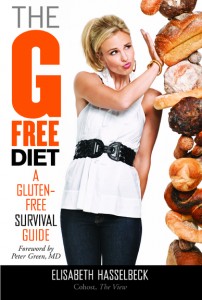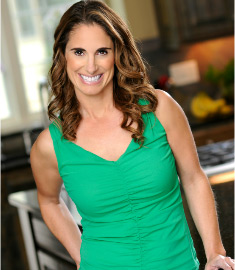 Going gluten-free is the latest glorified diet trend which has gained even more momentum with The View co-host, Elisabeth Hasselbeck’s, G-Free Diet book. You’ve seen specialized cookbooks while browsing the bookstore, and you’ve probably noticed an increase in gluten-free food offerings in your supermarket and on restaurant menus. So what’s the real deal? Does gluten actually have the bad rap it’s made out to have or is this just another baseless fad?
Going gluten-free is the latest glorified diet trend which has gained even more momentum with The View co-host, Elisabeth Hasselbeck’s, G-Free Diet book. You’ve seen specialized cookbooks while browsing the bookstore, and you’ve probably noticed an increase in gluten-free food offerings in your supermarket and on restaurant menus. So what’s the real deal? Does gluten actually have the bad rap it’s made out to have or is this just another baseless fad?
Gluten is a protein found in wheat, rye, and barley. In addition, many oats are contaminated by gluten due to processing in the same mills, so avoiding gluten often means avoiding heart-healthy oats as well. It can be hidden in more than 300 ingredients and additives, so going gluten-free is an intense lifestyle decision. Gluten-free products rely on such grains as amaranth, corn, rice, quinoa and potato flour. While up to 25% of Americans are requesting gluten-free foods, only 1% of the population actually needs them: those with celiac disease.
People with celiac disease suffer an autoimmune response to gluten, which results in damage to the intestinal villi that are responsible for nutrient absorption. Symptoms include diarrhea, bloating, weight loss, and slowed growth. If nutrient malabsorption continues, osteoporosis, neurological disorders, and some types of cancers can result. If you suspect you have celiac disease, it is important to consult a doctor prior to beginning a gluten-free diet, otherwise any test results will return inaccurately.
Just keep in mind, unnecessarily eliminating gluten from your diet, without a medical reason, can have potential negative effects on your health. Wheat is high in fiber, iron, and B vitamins that are not found in refined gluten-free baked goods. Weight loss associated with going gluten-free is often due to dieters simply cutting out carbohydrates without replacing their caloric value. In fact, it is possible to gain weight on a poorly planned gluten-free diet: gluten-free cookies are still cookies, after all.
Unless you have celiac cisease, there is little reason to subject yourself (or your wallet) to a tedious and expensive gluten-free diet. Instead, simply focus on getting a range of complex carbs throughout your day: wheat, oats, quinoa, spelt, amaranth, barley. Some have gluten and some don’t, but they’re all a perfect, healthy fit for your balanced diet. If you are considering going gluten free- one the best dietitians to help you is Shelly Case. Good luck!







My daughter who has autism would beg to differ with you. She used to wake up screaming in the middle of the night, have tantrums for no reason, and had cronic constipation. All of these things stopped within two days of being gluten free. Her speech has doubled, she is much more social, and she had more eye contact. These things are not our imagination – others who were unaware of the diet change have noticed huge positive changes. Please do more research before writing these types of articles in the future. Thousands of other moms will agree with me. The proof is in our kids.
That is great and I thank you for sharing your experience as a mom and as a mother myself, I think moms know best most all of the time. I’m just sharing that there is not scientific evidence showing an absolute link. However, if I had a child with autism, I’m sure I would try it out for myself to see if I noticed any improvement. And if I did, I would just make sure I did my best at making up for the lost nutrients in other ways. Here’s a good article from Web MD on eating gluten-free and autism. I wish you the best of luck with your daughter!
What are all these nutrients in wheat, etc. that can’t be found in any other grains? Sure, if you just switch from the standard American junk food diet to a gluten free junk food diet, you’re not going to be very healthy. But there are tons of healthy foods beyond wheat, rye, barley, and oats.
I got my life back after years of chronic fatigue by going gluten free. Lost a bunch of weight too, and it wasn’t from eating fewer carbs, just different ones. I wouldn’t knowingly eat gluten again for anything.
The main nutrients that can be lacking are fiber, vitamins (B vitamins) and minerals. Thanks for sharing your story. I’m speaking from a scientific perspective that to date there is no evidence of going gluten free causing weight loss if total calorie intake maintains the same.
Your generalized statements are ridiculous. Do you realize that you can do gluten free by cooking from scratch. Do we need cookies? Do we need crackers? Is that the only way to get fiber and/or other nutrients that gluten provides? You are so far off the mark it’s actually funny.
Thanks for your passion about this topic! I do think cooking from scratch is one of the best options for going gluten free. I have mentioned there is no definite link other than celiac disease with eating a gluten-free diet. I encourage people to get tested prior to changing diet to see if they might have celiac. If one chooses to go gluten-free, that is a personal choice. I’ve had some clients who tried it but they did not like the restrictiveness of the diet. It is very important that people who do go gluten-free make sure they get the nutrients in other ways. I would encourage them to see a physician and dietitian.
“The main nutrients that can be lacking are fiber, vitamins (B vitamins) and minerals”
I’m sure that’s true of some of the gluten free substitutes, but I rarely eat those, just like I rarely ate stuff made from white flour, which also lacks those nutrients.
Have you not explored brown rice, millet, quinoa, amaranth, etc? They’re all loaded with nutrients.
That’s great, maybe you did not see that I encouraged eating quinoa and amaranth in the article. I wish more people ate these nutritious foods. The reality is most people have never heard of quinoa. I have several recipes in the book I co-authored called The All-Pro Diet, coming out in a few weeks using quinoa. I also eat brown rice, millet, and amaranth and encourage others to do the same.
Hi Mitzi. I know as a dietician/nutritionist your point in writing this article was to make people aware that going gluten (and for Autistic Spectrum Disorders also often dairy, soy and corn) free is hard and it will take work to make up for the easy nutrients are ancestors found in gluten-producting grains, but honestly the problem in the lack of scientific research to-date is that no one believed us 25, 20 or even 15 years ago to start those studies which would give you the hard evidence the medical community esteems above anecdotal reports from thousands upon thousands of parents, kids, adults with CD, gluten intolerance, sufferers of ADHD, etc. ASD, in particular is a multi-faceted illness which often as multiple comorbid underlying caused. Those parents who chose biomedical interventions like a GFCFDiet know it’s going to take work but with more than 85% of them report huge gains for their children, it’s apparent that it’s not a shot in the dark, or the wild imaginings of some potential muechausen by proxy suffers. My list on yahoo groups has over 5000 member, has been around for 8 years now and has a recipe archives maintained off-site that help all those trying the dietary regime so they can provide the missing nutrients through the use of other options. Fibre can be easily replaced through the use of flax (unground) and other seeds in homemade breads, muffins and cookies for example. Our archives currently hold 2967 mostly tried and true recipes for everything from soup to nuts (so to speak) appropriate to seeing that every child whose parents try the gfcf diet have a great chance of succeeding and seeing the recovery of their lost child. It’s not like there are loads of medical interventions that work to RECOVER children from ASD and many parents are simply told this is it live with it. Why rain on the parade of hope?
Thanks for sharing your thoughts about the blog post. My article was truly more geared towards the average person today who is just deciding to go “gluten-free” because it is becoming the thing to do for people without any medical issues. My intentions were never meant to rain on any parade but I can see how a parent of a child living with autism could be frustrated to read that it hasn’t been proven to help when they have witnessed improvement through their own personal experiences. As I mentioned, I would do the same if I had an autistic child. I will edit my article to take out the part about autism and again appreciative you sharing your perspective with me. Wishing you all of the best
I read an article recently in Woman’s World about hidden food allergies, and the idea of gluten allergies was brought up. Upon reading the symptoms, I went yes to most of them. About two weeks before my latest appointment with my duabetes
doctor, I went on a gluten free diet for 1 week. I did a lot of internet research prior to my test, and notified my doctor to get her permission. In just ONE WEEK, my muscles began to loosen up and I was able to walk more, the gas and bloatiness eased up somde and I atually lost 4 pds without really trying.
It was hard to give up some items, but I can see a BIG difference in my health. The doctor tested me for Celiac disease, IBS and basic gluten allerg, luckily I was negative for celieac & IBS, even tho I do have a lactose intollerance, Yes, I believe a gluten free diet is one of the best and healthies ways to go…and would recommend it to everyone. I am learning to live with a modifies version of it, snd even my husband is following it and finally losing weight,
The often neglected part for a balanced diet is the fibre intake. We see the hype about importance of vitamins, proteins and other nutrients but fibre is often less talked about. The truth is that our body needs a good proportion of fibre in our diets for optimum functioning and leading a healthy life.